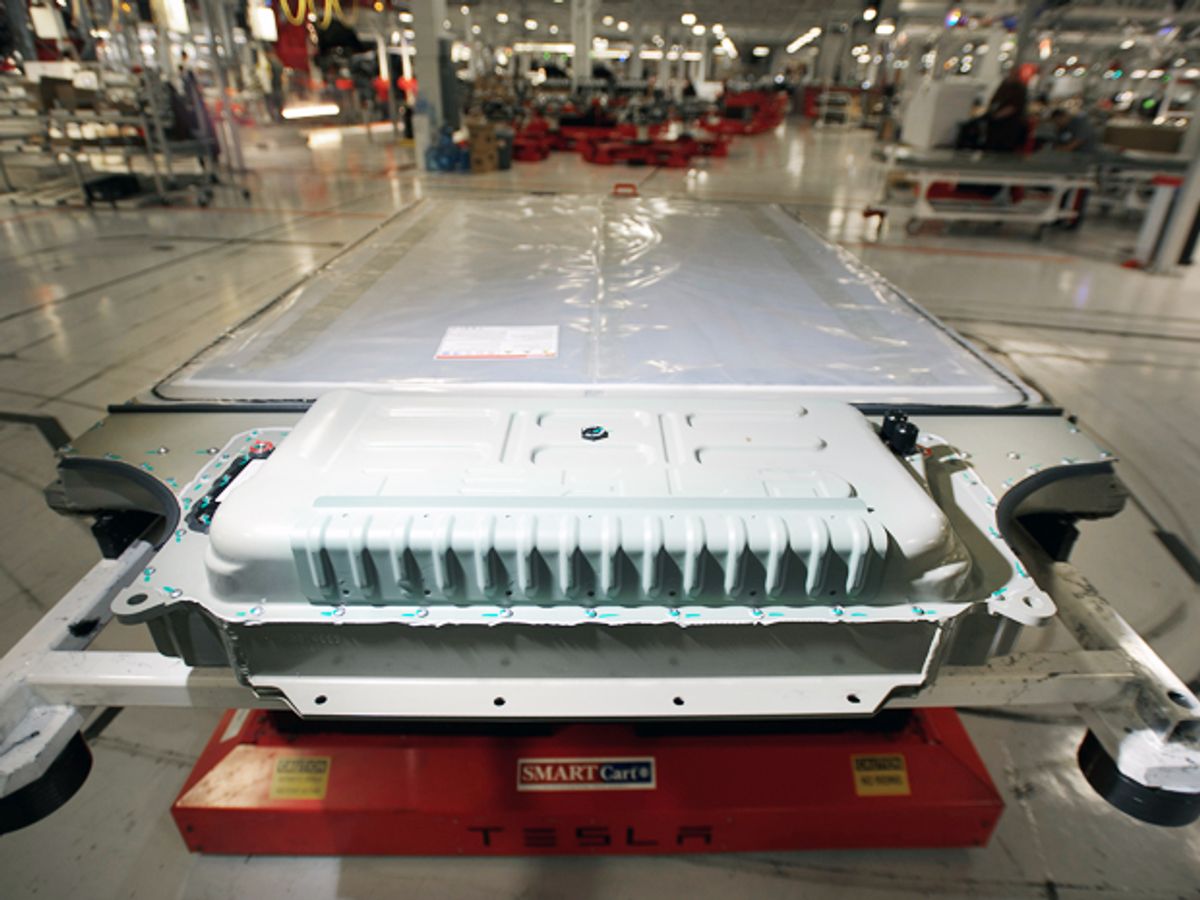Tesla Motors plans to build a huge U.S. battery factory capable of supplying 500 000 electric cars annually by 2020. The $5-billion "Gigafactory" is expected to produce more lithium ion batteries in 2020 than all the lithium-ion batteries produced worldwide in 2013—a huge step on the road to driving down the cost of battery packs and mass-market electric cars.
A completed Gigafactory running at full production capacity in 2020 would allow Tesla, founded by Silicon Valley entrepreneur Elon Musk, to have an annual battery cell output of 35 gigawatt-hours. The Gigafactory's initial launch in 2017 would coincide with Tesla's plans to introduce a lower-cost, mass-market electric car in the same year, according to The Wall Street Journal. But lower lithium-ion battery costs could also open the door for new power storage opportunities beyond electric cars.
"By the end of the first year of volume production of our mass market vehicle, we expect the Gigafactory will have driven down the per kWh cost of our battery pack by more than 30 percent," said a Tesla Motors press release.
Tesla's future ambitions depend upon the projected 30-percent drop in battery costs as a result of the Gigafactory scaling up production. The electric car company wants to give drivers the option of buying a $35 000 mass-market electric vehicle capable of traveling 200 miles on a single charge.
Tesla has already paved the way for expanding battery production by designing electric cars with huge battery packs. The company's Model S Sedan has a battery pack of either 60 kilowatt-hours or 85 kilowatt-hours, according to Forbes. That's three to four times larger than the battery packs used in a Nissan Leaf or Chevrolet Volt.
Today's average battery costs hover around $400 a kilowatt-hour, said Dan Hearsch, a battery expert at AlixPartners LP, in an interview with The Wall Street Journal. The newspaper also quoted Sam Jaffe, an analyst at Navigant Research, as saying batteries could become affordable backup power supplies for the power industry if Tesla can achieve its goal of lowering battery costs below $200 per kilowatt-hour.
Cheaper batteries could also open new business opportunities for companies such as Panasonic, the primary battery supplier for Tesla's Model S sedan. Panasonic was not mentioned in Tesla's Gigafactory announcement, but its own announcement on Wednesday said it was talking with other Japanese suppliers about possibly investing almost $1 billion in Tesla's battery factory. (Tesla said it would commit $2 billion toward building the Gigafactory.)
Tesla's website states that the Gigafactory will also produce 50 gigawatt-hours of battery packs per year in addition to producing 35 gigawatt-hours of battery cells. That implies the Gigafactory can act as a central facility for converting battery cells from other factories into battery packs, writes Mark Rogowsky, a Forbes contributor.
The Gigafactory's initial design depicts the the 405-hectare facility drawing upon local solar and wind power sources to meet its energy needs. Possible sites for the factory—Arizona, Nevada, New Mexico, and Texas—might start a bidding war to win the factory's 6500 jobs and $5-billion investment, according to Bloomberg News. Regardless of the factory's final location, it would ship battery packs to Tesla's existing factory in Fremont, Calif. for vehicle assembly.
Tesla's grand ambitions for lowering battery costs could still face significant hurdles in the years ahead as it tries to break ground on the Gigafactory. After all, the electric car company has no in-house experience building lithium-ion batteries, even if it does have partners such as Panasonic. But Bloomberg News reports that investors were bullish on Tesla's prospects as they helped Musk, Tesla's largest shareholder, add $1.1 billion to his personal wealth in just one day based on the Gigafactory news.
Photo: Noah Berger/Bloomberg/Getty Images
Jeremy Hsu has been working as a science and technology journalist in New York City since 2008. He has written on subjects as diverse as supercomputing and wearable electronics for IEEE Spectrum. When he’s not trying to wrap his head around the latest quantum computing news for Spectrum, he also contributes to a variety of publications such as Scientific American, Discover, Popular Science, and others. He is a graduate of New York University’s Science, Health & Environmental Reporting Program.



